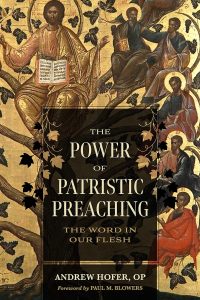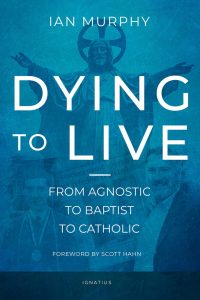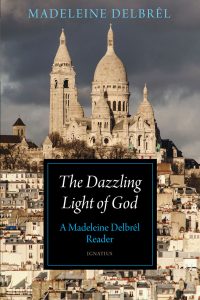The Power of Patristic Preaching: The Word in Our Flesh. By Fr. Andrew Hofer, OP. Reviewed by Br. Lawrence Joshua Johnson, CFR. (skip to review)
The Future of Christian Marriage. By Mark Regnerus. Reviewed by Fr. Anthony R. Lusvardi, SJ. (skip to review)
Dying to Live: From Agnostic to Baptist to Catholic. By Ian Murphy. Reviewed by Dennis Feltwell. (skip to review)
The Dazzling Light of God: A Madeleine Delbrêl Reader. Translated by Mary Dudro Gordon. Reviewed by S.E. Greydanus. (skip to review)
The Power of Patristic Preaching – Andrew Hofer
Hofer, Fr. Andrew, OP. The Power of Patristic Preaching: The Word in Our Flesh. Washington, D.C.: Catholic University of America Press, 2023. 389 pages.
Reviewed by Br. Lawrence Joshua Johnson, CFR.
 In The Power of Patristic Preaching, Dominican Father Andrew Hofer manages to tie the lives and preaching of seven Church fathers into a remarkably well constructed and edifying whole. At the heart of the book lies an exploration of what it means for the Word of God to take “the flesh of preachers so that those who hear them may experience in the sacramental life the power of the same Word in their own flesh.” (3) The three “touchstones” that run through the book are therefore “incarnation, deification through the virtues, and proclamation.” (14)
In The Power of Patristic Preaching, Dominican Father Andrew Hofer manages to tie the lives and preaching of seven Church fathers into a remarkably well constructed and edifying whole. At the heart of the book lies an exploration of what it means for the Word of God to take “the flesh of preachers so that those who hear them may experience in the sacramental life the power of the same Word in their own flesh.” (3) The three “touchstones” that run through the book are therefore “incarnation, deification through the virtues, and proclamation.” (14)
While each chapter stands on its own, the sequence of the chapters also follows a clear design. In each of the seven core chapters Hofer highlights a particular virtue in both the life and preaching of a specific Church father. While moving chronologically through the fathers, he also develops the virtues examined in a systematic manner. From the quest for holiness and humility as foundational virtues, the purification of faith and hope of salvation lead on to love of God and love of the poor. The final virtue is the acceptance of one’s own weakness in Christ. Hofer notes that the magisterium has repeatedly pointed to the Church fathers as a resource for priests, but also believes that “persons, not books, are the true Christian ‘classics’ that communicate the Word, and they become exemplars for other’s lives.” (33) Preachers who desire formation in virtue, then, should look not just to the writings of the Church fathers, but to the way their writings disclose how those men lived as Christians.
The aim of the book is therefore decisively pastoral, even if it also clearly retains a footing in the world of professional Patristics. Hofer clearly states in the Introduction that the book is intended primarily for “hearers and preachers of the Word, all those committed to evangelization and building up the Church” and only secondarily for students interested in early Christianity. (38) This pastoral desire means that he also begins each chapter not with the featured Church father, but with a brief account of a contemporary preacher who exhibits or treats the same virtue. The point is not “the dissection of what is dead” but something that can breathe life into preachers now. (38)
Origen is clearly a favorite of Hofer’s, a figure he admits in part “inspired the book.” (4) He also acknowledges that it is somewhat ironic to tie him to holiness, since of all the preachers examined, he alone is not canonized by the Church. Origen’s Homilies on Leviticus, though, highlight how teaching and preaching the Word is a sacrificial and priestly activity. He also shows how in exegesis and in preaching the priest aims to “further the transforming activity of Christ in the human soul.” (69) Holiness is the end both of preaching and of the preacher.
The treatment of Ephrem focuses on his development of a “soteriology of humility.” (98) In Scripture in particular, this humility can easily be missed. Surprisingly, Hofer’s treatment of Ephrem also examines closely some of his own failures to speak humbly, namely his attacks on heretics and on the Jews. Looking squarely at this reality invites us to take seriously Ephrem’s own admission of his unworthiness to proclaim the Lord’s praise. It also invites preachers to be mindful of their own “sinful pride.” (119) This awareness feeds naturally into the concern of Gregory of Nazianzus that a priest first be purified by faith before working to purify others. Within priestly ministry Gregory emphasizes the “first duty of the priest: the distribution of the Word, ‘that divine and exalted Word’ and the preaching of the Trinity.” (139)
The preaching of John Chrysostom in many ways exemplifies the desire that preaching lead to holiness. One way he did this was by eschatological preaching that consistently set before hearers the hope of heaven and the realities of judgment in ways that carried practical implications for their day to day lives. Particularly relevant for preachers who enjoy a certain popularity, Chrysostom also claims that a good preacher needs both the “contempt of praise and the power of eloquence” even if he also admits that it seems doubtful “whether anyone has ever succeeded in not enjoying praise.” (181)
Augustine highlights the role of love for the preacher in at least two ways. In On Christian Teaching he highlights how love is necessary in the way of finding what lies in the Scriptures and in the way of delivering what one has found to the congregation. (206) In highlighting Leo the Great’s love for the poor, Hofer also explains the particular social conditions of the day which brought an influx of poor to Rome. He examines the charge by some that Leo in some sense “dehumanized” the poor by seeing Christ in them or by offering them as merely an opportunity for acts of charity. While ultimately critical of this argument, Hofer clearly allows each figure to come into sharp focus as a real, imperfect human being. Indeed, he notes that “while these preachers give us reason to admire them and draw us to the Word incarnate, not a single one was or is now universally recognized as perfect.” (13) Each preacher carried Christ within them, even in the midst of their own weaknesses.
The book ends, therefore, with a very pastoral consideration of human weakness even in preachers as shown in the writing of Gregory the Great. In a particularly striking image from his homilies on Ezekiel, Gregory “presents a startling image of the Word of God as a sword that must cut through him to pierce his neighbor, as he himself must be cut for his sinfulness.” (297) Preachers must trust not in themselves but in the Lord, trusting that the Word can cut through their own weak flesh to both pierce and sanctify their own soul and reach and “cut” others.
The book clearly comes from someone with both deep and broad knowledge of the subject, and is in turns both informative and edifying. By closely expounding many Patristic writings that deal particularly with preachers and preaching, the book also serves as a good starting point for anyone who then wants to turn to a closer reading of primary sources that treat topics of interest for preachers.
Br. Lawrence Joshua Johnson, CFR holds an M.T.S. degree from the University of Notre Dame and is currently a seminarian for the Franciscan Friars of the Renewal studying at St. Joseph’s Seminary, Dunwoodie.
The Future of Christian Marriage – Mark Regnerus
Regnerus, Mark. The Future of Christian Marriage. Oxford, UK: Oxford University Press, 2020. 268 pages.
Reviewed by Fr. Anthony R. Lusvardi, SJ.
 This past semester I led a graduate seminar on the sacrament of marriage for an international group of theology students. To help us come to grips with current pastoral realities, I assigned sociologist Mark Regnerus’s engaging and insightful book The Future of Christian Marriage. The book makes use of social surveys, Regnerus’s own extensive research on the subject, and 200 interviews conducted with young Christians in seven different countries.
This past semester I led a graduate seminar on the sacrament of marriage for an international group of theology students. To help us come to grips with current pastoral realities, I assigned sociologist Mark Regnerus’s engaging and insightful book The Future of Christian Marriage. The book makes use of social surveys, Regnerus’s own extensive research on the subject, and 200 interviews conducted with young Christians in seven different countries.
Regnerus is honest about the challenges we face. Marriage rates are in decline across the globe even as, in many places, the definition of marriage in civil law has become amorphous. Fewer marriages mean that children are more likely to grow up in less favorable family conditions. Throughout the West, birthrates have plunged precipitously. The response of Christian leaders to the crisis of marriage and family has often been confusion or distraction. Regnerus correctly recognizes the decline in traditional marital norms not as a matter of private morality but as a question of social justice.
He also delves deeper into the question than discussion of “hot button” topics. At the root of Regnerus’s argument is the contention that attitudes toward marriage have changed from seeing it as a “foundation” to seeing it as a “capstone.” In other words, young people have increasingly come to see marriage as a capstone one acquires only after attaining personal, financial, and career success. This means that marriage is delayed, comes with more difficult-to-realize expectations of one’s spouse, and, for many, ultimately becomes unattainable. This is all part of the “atomization” of society as the individual become our primary social unit at the expense of families. Marriage is undoubtedly good for both society and individuals; it’s associated with all sorts of beneficial social outcomes from financial stability to better health. When individuals have to achieve these outcomes before entering into marriage, they cannot benefit from the mutual support and pooling of resources that the institution provides.
Regnerus’s book is full of references to studies on related themes and contains valuable footnotes. I was particularly struck by his insights on the negative effects of premarital sexual relations and cohabitation on future marital stability. This cuts against the conventional wisdom that the “test drive” of cohabitation leads to better marriages. The evidence says otherwise. Keeping open the option of trading in one’s partner for another model turns out not to be good preparation for the commitment of marriage.
Regnerus offers some suggestions for “revitalizing Christian marriage,” as well as predictions for the future. In the short term, we probably have some stormy seas to navigate as the destabilizing social forces that have undermined marriage over the past decades play themselves out. Regnerus also points out that today Christians tend to follow social trends — something not true of all religious believers, such as Muslims or Mormons. Since he acknowledges the importance of creating subcultures more favorable to Christian marriage, I wish he had explored the issue a bit more. What makes some believers more resistant to social pressure than others? He offers a fair critique of Christian leaders for avoiding addressing the crisis of marriage. One of his prescriptions for improving our situation is to better celebrate positive examples of marital fidelity. This prompted some healthy disquiet for me. So much recent energy within the Church has been focused on the “irregular” situations of those living outside of Christian marriage, but couples in difficult marriages who nonetheless struggle to make them work also deserve our attention — and appreciation.
Despite his sober assessment of current challenges, Regnerus’s study left me more confident in Catholic teaching on marriage. While he is not a theologian, several times Regnerus makes reference to the teachings of modern popes, from Leo XIII to John Paul II, and one is struck by the accuracy of their social insights. Moreover, Christianity’s demanding marital ethic remains attractive and provides a plausible response to the anxiety and driftlessness that dominates the lives of so many young people today. The Future of Christian Marriage provides a good starting place for many discussions the Church badly needs to have. Despite the challenges, at the end of reading it, I felt a greater confidence in the Christian vision of marriage and in its urgency.
Fr. Anthony R. Lusvardi, S.J., teaches sacramental theology at the Pontifical Gregorian University in Rome. He is the author of Baptism of Desire and Christian Salvation (Catholic University of America Press).
Dying to Live – Ian Murphy
Murphy, Ian. Dying to Live: From Agnostic to Baptist to Catholic. San Francisco, CA: Ignatius Press, 2020. 223 pages.
Reviewed by Dennis Feltwell.
 From ancient works like Augustine’s Confessions to modern offerings such as C.S. Lewis’ Surprised by Joy, conversion stories have captured readers’ imaginations throughout Christian history. In most autobiographies, the writer seems like the story’s hero as he recounts the events that unfold throughout his life; in the conversion story, though, God secures the decisive victory. The genre’s enduring popularity is somewhat curious since its name already gives the reader a clear expectation for the story’s conclusion. Nevertheless, each convert embraces the faith in some unique way. On a personal level, readers also discover that they can relate to a certain episode in the author’s story and find encouragement through this shared experience.
From ancient works like Augustine’s Confessions to modern offerings such as C.S. Lewis’ Surprised by Joy, conversion stories have captured readers’ imaginations throughout Christian history. In most autobiographies, the writer seems like the story’s hero as he recounts the events that unfold throughout his life; in the conversion story, though, God secures the decisive victory. The genre’s enduring popularity is somewhat curious since its name already gives the reader a clear expectation for the story’s conclusion. Nevertheless, each convert embraces the faith in some unique way. On a personal level, readers also discover that they can relate to a certain episode in the author’s story and find encouragement through this shared experience.
Unsurprisingly, then, Murphy’s account of his journey from doubt to faith, with several return trips, similarly retains themes from these classics. After adolescent struggles as an agnostic, Murphy comes to faith in Jesus Christ, then seeks ordination as a Southern Baptist pastor and, much later, engages theology as a Catholic doctoral student. In fact, it seems fitting that Scott Hahn writes the Foreword to Dying to Live. Thirty years ago, Hahn and his wife Kimberly recounted their own path to the Catholic Church in the popular classic Rome Sweet Home, which Murphy references multiple times in his book. Hahn describes Murphy as a “likable rebel” engaged in a fevered search for authority. At the same time, parts of Murphy’s adventurous conversion story resemble nothing like its predecessors.
Dying to Live reads like a spy novel strangely blended with elements from a medieval tale. On the one hand, the first chapter describes a helicopter chase. As class valedictorian, Murphy defied high-school and district administrators by praising Jesus in his speech. His act of resistance gained regional attention, and reports of his experiences helped to establish a new federal law against censorship. A news crew was preparing to fly to Michigan, where Murphy traveled for a family wedding from his home in Pennsylvania, to record an interview with him, if only they could find him. Throughout his book, Murphy also details anointed and nefarious conspiracies — divine, human, and even diabolical in nature — including the murder of his college youth pastor, Sam. His friend’s death sends Murphy into a prodigal period of wandering, both geographically and spiritually.
On the other hand, Murphy sketches a rich cast of spiritual mentors that echoes strains from Augustine’s Confessions. For example, he dedicates his book to his two grandfathers, “who prayed their family home,” and likens them to Saint Monica, who prayed for the conversion of her son Augustine. He also devotes large portions of his book to his wise Uncle Tim, an Ambrosian figure who counseled Murphy through multiple periods of doubt over several years. When Murphy attends his first Catholic Mass, his uncle and paternal grandfather join him. He writes admiringly about two professors who trained him in Baptist theology. Later, both would play critical roles in his discernment about entering the Catholic Church. Although many have names while others are anonymous (and a few pseudonymous), Murphy exhibits love and respect for each person as he recounts how each one provided guidance and comfort during his journey.
Moreover, he relates the extreme degree to which he wrestled with various aspects of faith and belief over the years. Again, like Augustine, Murphy delves into his earliest childhood memories to trace his faith journey’s primitive steps. For instance, he shares a humorous and touching scene from his first experience of “the heavenly Father’s intimate care,” one that led him to read picture versions of the Bible as a four-year-old boy. Murphy offers insights concerning his nascent self-awareness as a high-achieving student with an “addiction to extracurricular activities.” Even as a young schoolboy, though, he found that haunting doubts about God’s existence began to creep into his mind. Each chapter presents mostly chronological episodes that analyze the sources of his theological or philosophical doubts. However, Murphy does not always resolve these uncertainties by chapter’s end; some issues provide no definitive answers until his story’s climax.
Murphy’s skillful writing offers an intriguing narrative without resorting to melodrama. In fact, he peppers his story with scenes of hilarity that contrast starkly with his moments of intense reflection. His dramatis personae of spiritual heroes, who sometimes resemble a Tolkienesque fellowship, suddenly transform into a comedy troupe of costumed cows and Elvis impersonators. These ridiculous figures do not represent an attempt at Shakespearean comic relief. Instead, they are essential to Murphy’s narrative structure. In his aptly titled chapter, “The Comedy of a Broken Road,” Murphy takes on the troubling issue of hypocrisy in the Christian church. The problem, he notes, is not that Christians sin. After all, the whole Christian tradition demonstrates that Christ came to redeem sinners. Rather, hypocrites pretend that they do not sin. Thus, Murphy found it refreshing when he saw authentic ministers who remained “real people,” as he puts it, when they were around their flock. He contrasts these images to his encounter with a youth minister who chided a friend for what she considered to be a public sin, only to do the same thing in private. She justified her own actions by claiming that she was not “damaging her Christian witness” because others could not see her. Murphy’s keen use of humor shows that engaging in a deep relationship with God need not be a dour enterprise.
Throughout his story, Murphy also shows us that “we grow and decline along the path of life” in faith and virtue. What we do in the present stems from the past that brought us to this moment, and what we do today will influence our habits and character in the future. Yet we do not sojourn without rudder or wind. The Word and Spirit demonstrate remains present with us at every point. At root, the real value in Murphy’s story — quite apart from the adventure and drama — bears witness to the One Who guides our striving with grace and wisdom.
Dr. Dennis Feltwell is Provost of the East Campus at Pasco Hernando State College in Dade City, FL. He also serves as adjunct lecturer in graduate theology at Saint Leo University and Diaconate formation for the Diocese of Saint Petersburg.
The Dazzling Light of God – Madeleine Delbrêl
Delbrêl, Madeleine. The Dazzling Light of God: A Madeleine Delbrêl Reader. Trans. by Mary Dudro Gordon. San Francisco, CA: Ignatius Press, 2023. 139 pages.
Reviewed by S.E. Greydanus.
 Ven. Madeleine Delbrêl (1904–1964) was a remarkable woman: a revert to Catholicism after a youthful loss of faith, contemplative to the point of mysticism and ardent in service to those around her, a gifted writer who brings out truth with a beauty and clarity like new stained glass. Ahead of her time in many ways, she left insights that remain, sixty years after her death, as timely as the latest breaking headline.
Ven. Madeleine Delbrêl (1904–1964) was a remarkable woman: a revert to Catholicism after a youthful loss of faith, contemplative to the point of mysticism and ardent in service to those around her, a gifted writer who brings out truth with a beauty and clarity like new stained glass. Ahead of her time in many ways, she left insights that remain, sixty years after her death, as timely as the latest breaking headline.
Prefaced by a brief biography of Madeleine Delbrêl, The Dazzling Light of God is a collection of short readings, in a daily-meditation format, from throughout Delbrêl’s extensive writings. Each excerpt takes only a page or two, three at most (and the pages are small — 4.75 by 7.25 inches). Even within the readings, a line or two will often stand alone, suggesting that the author took a brief contemplative pause between each thought, and perhaps encouraging the reader to do the same.
The readings are not, so far as I can tell, grouped or ordered by subject matter; but certain themes emerge throughout:
- the urgent need for apostolic service (“Not to be apostles, not to be missionaries? But then what would it mean to belong to that God who sent his Son so that the world might be saved by him . . . and how?” 49);
- the needs of the modern world, especially its spiritual hunger, which Delbrêl knew so well both from her own atheist years and from living in a Communist town (“The Gospel has not only ceased to seem like news, but it has ceased to seem like good news,” 102);
- the responsibility of Christians for the world’s loss of faith (“We defend God like our property; we do not announce him as the life of all life . . . We are not heralds of the eternal newness of the Gospel, but polemicists defending a vision of life that we want to preserve,” 54);
- the indispensability of a deep interior life—and the possibility of this life even when circumstances are busiest! (“It is this desire that makes prayer and that makes it anywhere . . . The retreat to the desert can be five metro stops at the end of the day,” 120);
- perhaps most distinctively, the way of sanctity for ordinary lay people. Delbrêl anticipated the Second Vatican Council’s promotion of the universal call to holiness with her ringing conviction that “we, the ordinary people of the streets” are no less called to the heights of holiness than those “people whom God takes and sets apart” (25), a truth of which her own life was concrete testimony. “We, the ordinary people of the streets, believe with all our might that this street, that this world where God has placed us, is, for us, the site of our holiness. We believe that we lack nothing necessary, because if any necessity were missing, God would have already given it to us.” (25)
This is a book to be read slowly, taking one reading in a day and savoring each line. The writing is rich, dropping deep thoughts in vivid imagery, in words like the following: “All this [the work we have to do] is but the outer shell of a resplendent reality, the soul’s encounter with God, every minute renewed . . . There is someone at the door; quick, let us open it. It is God who comes to love us” (78). Many of the readings are indeed poems.
On the other hand, though rich and profound, the style is not “dense” in the sense of inaccessible. While some of the readings require some effort to unpack, this is a book for “the ordinary people of the streets,” written with a keen understanding of people’s lives and struggles both inside and outside the Church. In particular, Delbrêl has much to say to those like her, facing the challenges of pursuing holiness in an everyday environment in the world, both the broad challenges of a secular environment and the little tiresome pains that are seldom recognized as “the martyrdom that was prepared for us” (85). For those seeking a deeper understanding of how to live some aspect of the Christian life in their own circumstances, these insights from a woman whose love of God unified everything he asked of her will be a welcome gift.
S.E. Greydanus is a graduate of Christendom College and managing editor of Homiletic & Pastoral Review.

Recent Comments